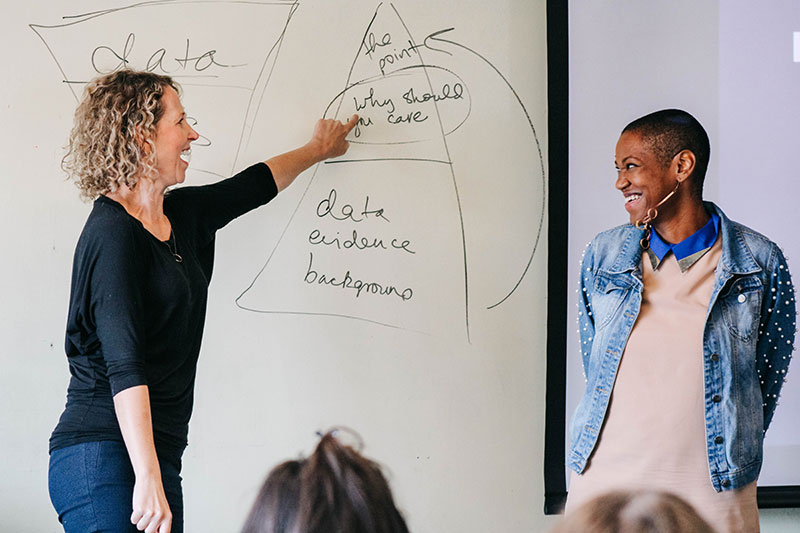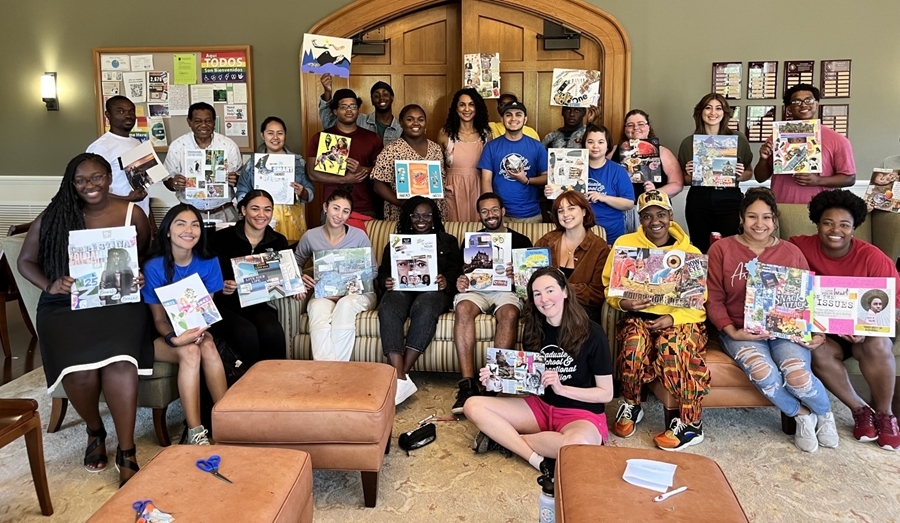When DeJuan Gilchrist arrived on the U of A campus this month to begin his M.F.A. in drawing, he found himself a stranger in a strange land. An Atlanta native, Gilchrist knew no one from Arkansas before deciding to study here — and not only that, but he was predictably nervous about the transition to graduate school.
But Gilchrist is already finding a sense of belonging and community at the U of A through the Razorgrad Institute for Success and Engagement (RISE), a program committed to developing an inclusive environment that encourages student success by investing in promising new graduate students from historically underrepresented populations.
"I was definitely nervous about transitioning to grad school — I still am," Gilchrist said. "But the RISE Program helped ground me. I was able to communicate with other first-year graduates with the same concerns and realize that we were all in the same boat, then speak with those who'd already gone through the graduate process and hear how they navigated it."
RISE, offered by the Office of Graduate Student Support in the Graduate School and International Education, has helped students transition to graduate school since its creation five years ago, when GSIE leadership identified the need for programming that would assist underrepresented graduate students as they transitioned into graduate study. A gift from the Hearst Foundations in the fall of 2021 provided funding for the RISE program to offer expanded programming and additional scholarships to increase enrollment in the program.
"We are always looking at ways to increase support and community among our graduate students, and the RISE program has helped bring more bright, energetic, potential changemakers to the University of Arkansas and help them succeed," said Laura Moix, director of graduate student support. "Not only that, but it offers more synergistic effects in the form of diversifying our campus and creating a more inclusive and equitable campus community."
 Sarah Goforth (left) works with Chy’na Nellon during a session on developing students’ personal elevator pitches. |
Twenty-two students are participating in this year's program, which kicked off Aug. 8 with a week of activities including a crash course on campus resources, tours of university facilities such as the Pat Walker Health Center and University Libraries, and discussions around topics such as dealing with imposter syndrome, how to be mentored and how to find your way at a predominantly white institution.
"RISErs, as they are affectionately known by our office, are involved in activities focused on self-empowerment, creating community and how to access key resources," Moix said. "But most importantly, they form a tight-knit community of friends, advisers, mentors and supporters at the U of A."
And the data bears out the program's success. On average, students participating in RISE have a 93 percent retention rate, compared to 83 percent of the university's white graduate student population and 76 percent of all underrepresented minorities.
For Virginia native Christina Barnes, a member of the 2019 cohort who is pursuing her Ph.D. in experimental psychology, the programming provided a unique window into campus — and into herself.
"There are lots of on-campus responsibilities and shared opportunities that I've had the opportunity to be a part of, and RISE is by the far the most impactful and meaningful," she said. "I really feel like I would not have had the success I have had in grad school if I hadn't had those transformative experiences in RISE. It goes deeper than some other onboarding programs. It's more than, 'Let us show you around and introduce you to things.' RISE helps you learn skills that you never would've thought you needed otherwise."
But most importantly, the program emphasizes personal growth and marketability to students. Students participate in guided meditations, a values exercise and an empowerment discussion. Sarah Goforth, executive director of the Office of Entrepreneurship and Innovation, also works with each student in the cohort to craft a two-minute personal elevator pitch, which they develop throughout the week and deliver to university administrators and others at the program's reception dinner.
"For a lot of them this is the first time they have stood in front of an audience and communicated who they are, why they're here and what they need," Goforth said. "I work with the students to make the most of this opportunity by telling their story in a compelling way and then asking, authentically, for the help that they need - for some, this is internship connections, for others it is mentorship, and for others it is a graduate assistant role or help finding resources to fund their research. We make a lot of connections for the students after the meeting because they have asked for help."
Goforth originally became interested in the program as an opportunity to recruit for the graduate certificate in entrepreneurship, but she quickly realized the impact of her participation in the program.
"It's not a recruiting opportunity for me anymore," she said. "I deeply believe in the RISE program for the value it provides students. It's short in duration but long on impact. It's one of the most transformative experiences for graduate students that exists on our campus."
For Barnes, creating her own personal story in elevator pitch form was one of the most valuable experiences in the program - and a skill she has carried with her during her studies at the university.
"Starting off, I was like, 'I don't want to do this; what's the point?' But it's absolutely a skill I use all the time, and it's been so beneficial in driving me forward," she said. "You don't realize it until it's already over, but I can see how all the things that we do throughout the week build to help us tell our story, and that story is ultimately what's going to help us go on to helpful productive careers."
When Barnes finished the program, she knew "right away" that she wanted to serve as a mentor in the program for the next year's cohort.
"I just felt like RISE was so impactful, and I love talking to people and getting to know people, so I thought I would happily share my knowledge," she said. "Being in RISE helped me get an assistantship and helped me meet people who became close and valuable friends, and every year that I'm in the program as a mentor I can help guide people to those same experiences — to find impactful mentors or long-lasting friendships. That's so valuable, because if I had come a year or two earlier, RISE may not have existed. And I don't know if I would've been able to make the most of my experience if that hadn't been how I started things off."
Five years later, Moix sees the impact of the program in not just the successes of students, but also in the bonds they've created with each other.
"I've seen them become more empowered and confident in telling their own story," she said. "But I've also seen them make genuine lasting connections with each other and realize that the graduate school is a place where they belong, and the larger community of academia is a place where they can contribute."
Topics
Contacts
Laura Moix, director of graduate student support
Graduate School and International Education
479-575-7038,
John Post, director of communications
Graduate School and International Education
479-575-4853,
